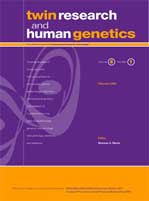Twin Research and Human Genetics
 | |
| Discipline | Genetics |
|---|---|
| Language | English |
| Edited by | Nick Martin |
| Publication details | |
Former name(s) | Twin Research |
| History | 1998-present |
| Publisher | Cambridge University Press |
| Frequency | Bimonthly |
Open access | Delayed, after 12 months |
Impact factor | 1.159 (2018) |
| Standard abbreviations ISO 4 (alt) · Bluebook (alt1 · alt2) NLM (alt) · MathSciNet (alt  ) ) | |
| ISO 4 | Twin Res. Hum. Genet. |
| Indexing CODEN (alt · alt2) · JSTOR (alt) · LCCN (alt) MIAR · NLM (alt) · Scopus | |
| ISSN | 1832-4274 (print) 1839-2628 (web) |
| LCCN | 2005243379 |
| OCLC no. | 58840748 |
| Links | |
| |
Twin Research and Human Genetics is a peer-reviewed scientific journal published bimonthly by the Cambridge University Press. It is the official journal of the International Society for Twin Studies (ISTS) and the Human Genetics Society of Australasia. The journal covers research on the biology and epidemiology of twinning as well as biomedical and behavioral twin- and molecular-genetic research. According to the Journal Citation Reports, it has a 2018 impact factor of 1.159.[1] The journal was established in 1998 and has been edited by Robert Derom (1998–1999), and Nick Martin (2000–present). The title is a translation of Acta Geneticae Medicae et Gemellologiae, from 1952 until 1978 the official organ of the Permanent Committee for the International Congresses of Human Genetics and Società italiana di genetica medica,[2] the original title of the first journal of the ISTS.
References
- ^ "Twin Research and Human Genetics". 2018 Journal Citation Reports. Web of Science (Science ed.). Clarivate Analytics. 2019.
- ^ Acta geneticae medicae et gemellologiae: Organo ufficiale del Permanent committee for the International congresses of human genetics e della Società italiana di genetica medica : Twin research. OCLC 474005097.
External links
- Official website
- v
- t
- e
This article about a psychiatry journal is a stub. You can help Wikipedia by expanding it. See tips for writing articles about academic journals. Further suggestions might be found on the article's talk page. |
- v
- t
- e










